- Home
- Marcia Talley
Occasion of Revenge
Occasion of Revenge Read online
PRAISE FOR AWARD-WINNING AUTHOR
MARCIA TALLEY
AND THE HANNAH IVES MYSTERY SERIES
UNBREATHED MEMORIES
“An engaging combination of domestic drama and murder mystery … Talley’s Hannah is an irresistible protagonist.”
—Publishers Weekly
“An exciting family drama with a high element of suspense … fascinating.”
—Romantic Times (Top Pick)
“Superb.… Talley’s narration is whimsical and breezy and she has fun telling her tale.”
—Mystery News
“Marcia Talley is a real find.”
—The Poisoned Pen
“An entertaining mystery … intriguing and fun … Marcia Talley is a bright light who has enlivened the amateur sleuth galaxy with the opening act of what should be a warm, long-running series.”
—The Midwest Book Review
“Talley has created characters that are real, flawed, and likable … you want to keep reading to find out what’s going to happen to these folks down the road.”
—The Pilot (Southern Pines, N.C.)
SING IT TO HER BONES
“Talley … demonstrates both a penchant for storytelling and a flair for character development.”
—The Baltimore Sun
“A powerful, moving story … Marcia Talley’s Hannah Ives is a great new character and voice for mystery lovers.”
—Steven Womack, Edgar Award–winning author of
Dirty Money
“[An] assured and accomplished first novel … More Hannah Ives, please! This is one to watch.”
—Kate Charles, author of Unruly Passions
“[SING IT TO HER BONES] is rich in local color as well as plotting and writing. It is a promising introduction to a new writer and a new character we want to see again—and soon.”
—The Washington Times
“A dazzling debut mystery … this is a series with the right stuff. Don’t miss this one.”
—MLB News
“No one can match Marcia Talley’s unsentimental view of the tangled, complex relationships among adult family members: people who must be, at one and the same time, parents, children, sisters, wives. That she can tell a good story while she’s at it—and is even funny— is Talley’s special gift.”
—SJ Rozan, Anthony and Shamus
award-winning author of Stone Quarry
Published by
Dell Publishing
a division of
Random House, Inc.
This is a work of fiction. Names, characters, places, and incidents either are the product of the author’s imagination or are used fictitiously. Any resemblance to actual persons, living or dead, events or locales is entirely coincidental.
Copyright © 2001 by Marcia Talley
All rights reserved. No part of this book may be reproduced or transmitted in any form or by any means, electronic or mechanical, including photocopying, recording, or by any information storage and retrieval system, without the written permission of the publisher, except where permitted by law.
Dell® is a registered trademark of Random House, Inc., and the colophon is a trademark of Random House, Inc.
eISBN: 978-0-307-80893-6
v3.1
Contents
Cover
Title Page
Copyright
Epigraph
Chapter 1
Chapter 2
Chapter 3
Chapter 4
Chapter 5
Chapter 6
Chapter 7
Chapter 8
Chapter 9
Chapter 10
Chapter 11
Chapter 12
Chapter 13
Chapter 14
Chapter 15
Chapter 16
Chapter 17
Chapter 18
Chapter 19
Chapter 20
Dedication
Acknowledgments
Other Books by This Author
About the Author
Talk not to me: I will go sit and weep,
Till I can find occasion of revenge.
—William Shakespeare
The Taming of the Shrew
Act 2, Scene 1
chapter
1
Two years ago I didn’t think I’d live long enough to make it to my next chemotherapy session, let alone see my widowed sister-in-law happily remarried. But God had been gracious, sending good health my way and Dennis Rutherford to Connie.
Nothing less could have persuaded me to appear at St. Philip’s that bright Saturday afternoon, to stand in the brides’ room in front of a full-length mirror wearing an idiotic grin and the matron-of-honor dress from hell. Connie cheerfully assured me I would be able to wear it later on, but I secretly doubted that outfit would ever make it out of the plastic dry-cleaning bag I planned to hide it in once her wedding reception was over.
While Connie hovered nearby, fussing with the veil on her Jackie Kennedy–esque hat and looking radiant in a white linen sheath topped with an elaborately embroidered bolero jacket, I zipped myself into a dress with defensive shoulder pads that made me look like a wedge of lemon meringue pie. Frankly, with her artist’s eye, I’d expected better from Connie, but for some reason she’d set her mind on this particular number, a cocktail dress in a bilious shade of yellow that turned my olive skin a sallow green. I leaned toward the mirror. I smiled. At least the low-cut bodice showed off the swell of my newly reconstructed breast to advantage. The short, narrow skirt made the most of my ankles, too, slim above dyed-to-match T-strap pumps. But my daughter Emily was right: Even with camouflaging pearl-tone panty hose, my knees were not ready for prime time.
Veil adjusted to her satisfaction, Connie picked up the bouquet of stephanotis and gardenias she would carry down the aisle. I had a single gardenia clamped to the side of my head with four hundred bobby pins, and my brownish hair had been tortured into a twist with so much hair spray that if a hurricane had swept through the church just then, leaving nothing of St. Philip’s standing but its eighteenth-century pulpit, I’d have been found miles away in a tree, stone cold dead but with nary a hair out of place.
A trumpet fanfare blared from the organ in the sanctuary. I shivered. I’m a sucker for trumpets. Even the Hallelujah chorus from The Messiah makes me swoon.
I pulled a tissue out of my sleeve and handed it to Connie so she could blot her lipstick. “Ready?”
She gave me a hug. “Hannah, darling, I’ve been ready for this day for over a year!”
My sister-in-law’s parents had passed away years ago, so she had dispensed with the usual giving-the-bride-away bit. It was just me, marching down the aisle to Jeremiah Clarke with Connie trailing stunningly behind.
I was so nervous—Did I have the ring? Was everything set with the caterers? It wouldn’t dare rain, would it?—that the ceremony itself remains pretty much of a blur. I remember how yummy the best man looked in his tuxedo—of course, I was married to him—and holding my breath when Reverend Lattimore got to the speak-now-or-forever-hold-your-peace part. But the pregnant pause was filled only with the intrepid hum of the heat pump trying to warm up the church on that crisp November day, until Connie, hearing no objections, curled her free hand into a fist and pumped it toward herself: Yes! I couldn’t suppress a nervous giggle.
During the homily, while Reverend Lattimore droned on about Perfect Love, paraphrasing heavily from Hosea, Ruth, and Song of Solomon, I noticed Dennis’s daughter, Maggie, looking like a daffodil perched on the edge of her pew in the first row on the groom’s side. With her black hair and pale Irish skin, the color so complemented her that I began to suspect a conspiracy in the nuptial color scheme depart
ment. Connie’d do anything to keep Maggie—who had a long way to go before completely accepting her father’s choice of bride—happy. The two rows behind Maggie were occupied by men with commendable posture whom I took to be police officers, colleagues of the groom.
On the bride’s side of the aisle sat my sister Ruth, her rapidly silvering hair intricately braided. Next to her, eleven-month-old Chloe squirmed happily on her mother’s—my daughter, Emily’s—lap. Emily’s husband, Dante, whose given name is Daniel Shemansky, had moved his family back east from Colorado to accept a job at New Life, a health spa in the Blue Ridge Mountains of Virginia so exclusive that if you didn’t Know Somebody, you had to have reservations years in advance. I was delighted he’d be massaging bodies closer to home. And until they found a place of their own, they were staying with Paul and me in Annapolis, an equally delightful arrangement.
In the row behind Emily sat my sister Georgina and her husband, Scott, distracted. No doubt they were reconsidering the advisability of bringing children under the age of ten to a wedding. Both were trying to retain control of their twin sons, Sean and Dylan, now eight, who were being encouraged to draw pictures on their wedding programs, while five-year-old Julie perched primly, cradling her toy rabbit. Abby’s poor, fur-free ears had been coaxed into a white lace doll bonnet, its strings tied under the rabbit’s chin in an enormous, untidy bow.
And behind them, Daddy. By the prismatic light streaming in through a stained-glass window, Daddy looked flushed and happier than I had seen him since the death of our mother. He wore that sappy half-happy, half-solemn look you get at weddings, where your mouth smiles but you have to keep hauling out the tissues to dab at your eyes.
I gazed around the sanctuary, imprinting these joyous faces on my brain, praying they’d erase the painful memory of my previous visit to St. Philip’s on the occasion of young Katie Dunbar’s funeral. That sad day would never fade altogether, of course, but my heart soared when the organist swooped into Charpentier’s trumpet tune, her feet in black lace-up oxfords pumping up and down like well-oiled pistons along the pedal board.
As Paul and I recessed behind the bride and groom past the row where my father sat, he whispered an aside to a frizzy-headed blonde sitting in the pew next to him, then smiled broadly in my direction. He winked. I sent a thousand-watt beam back. Not hard for someone wearing a sunshine suit.
Although I had worried about it, too, during the exchange of vows, the stretch limo Paul had arranged was dutifully waiting at the curb. After posing on the church steps for an untold number of photographs, Dennis extracted his daughter, Maggie, from a private conversation with Reverend Lattimore, I waved a see-ya-later to my daughter and her little family, and the wedding party settled in behind tinted windows for the three-block drive to historic Dulaney House, picking grass seed out of our hair and clothes. “If it rains,” I commented cheerfully, “I’m going to sprout like a Chia Pet.”
“Do you believe that nonsense about the rice?” Paul asked as he adjusted my hairdo and poked a few more bobby pins into my sagging gardenia. At the rehearsal, Reverend Lattimore had forbidden rice, citing a wedding where the out-of-town guests had thrown Minute Rice. The seagulls, he said, had swooped down, eaten it, puffed up, and died in the courtyard of the Hillcrest Nursing Home across the street.
“Urban legend.” The limo eased to a halt. “Or at least a village one.”
Connie leaned across the seat, her hand resting lightly on Dennis’s knee. The new half-carat diamond-and-platinum ring she wore caught the sun, sending a dot of light ricocheting across the upholstery. “Speaking of legends, Washington actually slept here, you know.” She indicated a second-story window on the far left of Dulaney House. “He was coming from Virginia to resign his commission at the Annapolis State House and he waited here for the weather to improve before crossing the Truxton by ferry.”
I ducked my head and stared at the spot where Connie was pointing. An ordinary window. “You sure?” I chuckled. “George Washington didn’t live enough nights in his whole life to sleep everywhere attributed to him. When would he have time for Martha at Mount Vernon?” We unfolded ourselves from the vehicle, Connie and Dennis first, and entered the house.
If old George had actually stayed at Dulaney House on that cold December day in 1783, I doubt he’d ever seen it looking so beautiful. Constructed solidly of brick with generous windows and bright white trim, the central three-story house was flanked by identical one-story wings, connected to the main house by passageways called hyphens. An ornately carved doorway led into an entrance hall where a central stairway curved up and away to our right. We passed straight through into the ballroom, where a string quartet had arranged itself on a fine Oriental rug near a wall of French doors leading out into the garden. They were playing one of Vivaldi’s seasons—“Winter,” I think, appropriate to that fine November day two days after Thanksgiving. In contrast, baskets of flowers screamed spring. Arrangements of tulips, daffodils, and lilies decorated tall pedestals flanking the doors. Smaller arrangements had been placed on circular tables covered with white damask tablecloths. Servers in black pants, white shirts, and festive bow ties snaked smoothly through the crowd bearing platters of crab balls, egg rolls, and shrimps, while two bartenders near a walk-in fireplace at the far end of the ballroom efficiently mixed drinks.
Daddy was already there, standing at the bar, holding a glass of wine in one hand while the bartender handed him what looked like a super-dry martini on the rocks. While Paul disappeared into the cloakroom with our coats I hurried over to greet my father.
“Two-fisted drinker?” I forced a smile.
“No.” He kissed my cheek. “It’s for Darlene.” He gestured with the martini. “Over there.”
I sighted along his arm until I saw, at the end of it, the blond woman who had been sitting next to him in church. I pasted a smile on my face—what Paul calls my perma-grin: stretched lips, full teeth, like rigor mortis had set in. “She doesn’t look like the martini type.”
“She isn’t.” He waved the glass under my nose and I caught the unexpected odor of mouthwash.
“Yuck. What’s that?”
“Peppermint schnapps.” He raised a bushy eyebrow. “Want one?”
“Daddy, I’d rather drink battery acid.” I tipped my wineglass to my lips and took a sip of cool, crisp chardonnay, studying his lined but still handsome face over the rim.
“I’d have to agree, but Darlene says it’s not a special occasion if she can’t have her schnapps.” Daddy planted a light kiss on my forehead. “Save a dance for me, sweetheart?”
“Of course, silly.” But I was speaking to his back as Daddy turned and glided off to the lady-in-waiting, leaving me stranded by the bar, feeling like a wallflower.
“Penny for your thoughts.”
“Paul!”
Confirming my suspicions about the lemon meringue pie, Paul said, “You look good enough to eat,” and nibbled on my neck in lieu of an appetizer.
“So do you. I wish we were sailing off to the Caribbean along with the happy couple over there.” I gestured with my glass in the direction of the hallway where Paul’s sister, Connie, was standing with her new husband in the curve of the staircase, manning an informal receiving line.
“Maybe on my sabbatical next year.”
“Hah! That’ll be the day! What’s a math professor going to do on a sailboat that will count as research?”
“Think.”
“About what?”
“Patterns.”
“Like what?”
“The parabolic arcs of flying fish trajectories.”
I laughed out loud. “I can’t believe that anybody would pay you to do research like that.”
Paul led me over to the bar where we joined a short line. “Ah, that’s where you’re wrong, my dear. It’s rumored that someone’s about to offer a million-dollar prize to the first person who can prove Goldbach’s Conjecture.”
“What’s that?”
We wandered over to our table and sat down. “Goldbach stated that every even number greater than two is the sum of two primes.” Paul patted the breast pocket of his tux jacket and I worried that he’d pull out a pen and start illustrating this for me on the tablecloth, but fortunately the only thing in his pocket was a decorative handkerchief.
“That seems fairly obvious,” I said, “even for a French major.”
“Ah, yes,” Paul replied. “But nobody’s ever been able to prove it.”
“I see.” I sipped my wine. “It’s like extracting the square root of pi. It could go on and on and on.”
He nodded.
“Well, I’m sure you’ll figure out something, and when you do—sweetheart, honey lamb, sugar pie”—I grinned at him, toothily—“I’ll be sure to sign on as first mate.”
“How about chief cook and communications officer?”
“That, too.” The way he was looking at me, I thought he might have a second honeymoon on his mind—starting that night.
“Look, there’s old Mr. Schneider!” Paul kissed the air next to my cheek. “Let me say hello to the old boy.” He loped off in the direction of a tuxedoed gentleman in a wheelchair being pushed by an attendant up a ramp from the garden and into the ballroom. Mr. Schneider was the father of Dennis’s deceased first wife.
“Oh, my poor ears and whiskers!” The bride, looking flushed, materialized on my right so suddenly that I nearly spilled my wine.
“Dennis deserted you already? The cad!”
Connie flopped into a chair, removed a punishing high-heeled shoe, and began massaging her toes. “We gave up on the receiving line. Dennis is off in the library, back-slapping with his buddies. Get me a drink, would you?”
“Wine?”
“That would be lovely.”
“White or red?”
Connie indicated the pristine white landscape of her wedding outfit and made a face. “Duh!”
I returned from the bar with a glass of white wine for Connie just as Daddy’s new friend cut loose with a high-pitched cackle that carried over the sawing of the strings launching into “Spring.”

 Unbreathed Memories
Unbreathed Memories Tangled Roots
Tangled Roots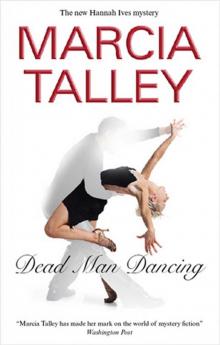 Dead Man Dancing
Dead Man Dancing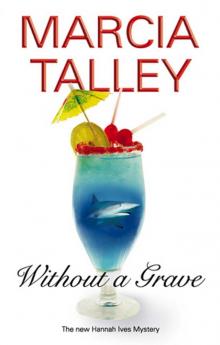 Without a Grave
Without a Grave Sing It to Her Bones
Sing It to Her Bones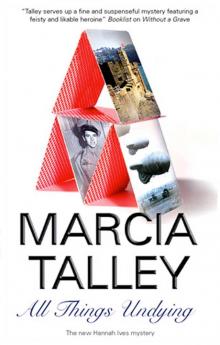 All Things Undying
All Things Undying Naked Came the Phoenix
Naked Came the Phoenix Daughter of Ashes
Daughter of Ashes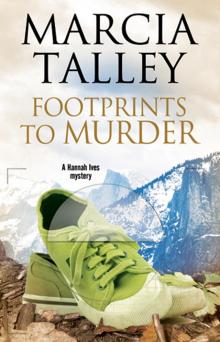 Footprints to Murder
Footprints to Murder The Last Refuge
The Last Refuge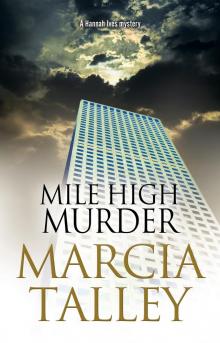 Mile High Murder
Mile High Murder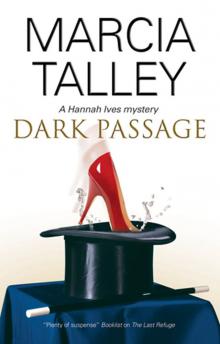 Dark Passage
Dark Passage This Enemy Town
This Enemy Town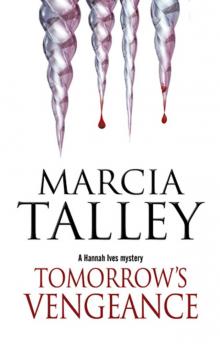 Tomorrow's Vengeance
Tomorrow's Vengeance Occasion of Revenge
Occasion of Revenge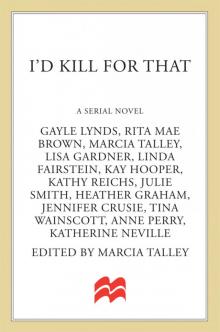 I'd Kill For That
I'd Kill For That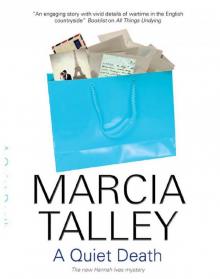 A Quiet Death
A Quiet Death